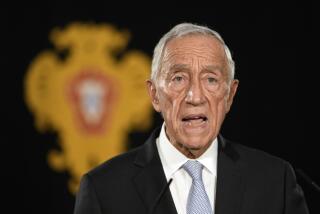Brazil OKs Taxes to Ease Crisis
- Share via
RIO DE JANEIRO — In a sign that Brazil is finally ready to impose critical reforms to save its tottering economy, the lower house of Congress reversed itself Wednesday and approved stiff new taxes to reduce an enormous budget deficit.
Legislators’ willingness to tax civil service workers and retirees--something they had refused to do on four previous occasions--was a major political victory for President Fernando Henrique Cardoso.
It was congressional blockage of key reforms that alarmed international investors and helped trigger the 20%-plus devaluation of Brazil’s currency beginning last week, pushing the country deeper into recession.
The lower house approved measures that will reduce losses in social security and take a bite out of a horrific budget deficit that amounts to 8% of Brazil’s gross domestic product.
The pension tax bill now advances to the pro-government Senate, where approval is almost guaranteed.
Economists said Cardoso’s hard-won victory will go a long way in calming fears that Brazil might undergo a Russian-style collapse, dragging much of the region with it.
Wednesday’s action alone will not ensure stability. But it was a make-or-break vote on a politically volatile issue at a time when Cardoso, facing soaring interest rates and a threatened tax mutiny by seven state governors, desperately needed a win.
Cardoso’s defeats last month in his legislative initiative to cut the deficit were a principal reason for the ebbing investor confidence that led to the devaluation, even after Brazil in November had received a $41.5-billion rescue package from the International Monetary Fund.
“If it hadn’t gone his way, this would have been a turning point for the worse, much worse,” said Luis Fernando Lopes, a Banco Patrimonio economist in Sao Paulo, who said Brazil is still skirting perilously close to financial chaos.
Such fears have plagued Brazil since it decided last week to let its currency, the real, float freely on world markets, after vainly spending nearly $50 billion in reserves to prop it up.
Since Cardoso’s inauguration in 1994, his so-called Real Plan has led to Brazilian economic growth, stability and an end to the chaos brought on by two decades of hyper-inflation. The devaluation was a bitter capitulation to a four-year effort to stabilize the real, and his surrender last week has raised fears of a return to the bad old days of inflation.
In an address to the nation after Wednesday’s vote, Cardoso said it proves that its citizens are ready to take responsibility for the fiscal mess.
“This will add an enormous sense of relief that Brazil can defuse the crisis that it helped set off,” said economist Thomas Trebat of Salomon Smith Barney. “But it doesn’t loosen the fiscal noose around its neck.”
Wednesday’s vote came after the close of Brazil’s financial markets, which were anticipating the victory and continued a four-day winning streak. The largest Brazilian stock index, Sao Paulo’s Bovespa, closed at 7,674 points, up 3.97% on the day.
The real closed at 1.59 to the dollar, a 1.6% decline on the day but close to the 1.60 “equilibrium” that many observers say the currency is worth. Before the devaluation, it stood at 1.32 to the dollar.
Wednesday’s success means Cardoso has gotten roughly two-thirds of the $19 billion in deficit reduction measures through Congress that he promised the IMF he would get when the agency granted him the $41.5-billion rescue package last fall.
The target is to cut enough of the deficit to reduce it to 4.7% of gross domestic product, from the current 8% rate.
Brazil still faces enormous fiscal problems, including a mountain of debt and padded civil service payrolls. Rising interest rates have lifted the cost of servicing its debt, which has led to speculation that Brazil would have to ask its international creditors to restructure it. Finance Minister Pedro Malan denied that Wednesday after talks in New York with Wall Street investment leaders.
The country is heading into a recession that could equate to a 2% to 5% shrinkage of economic output. Inflation is expected to rise to at least 6% from last year’s 1.7%, and unemployment will jump as a result.
The best evidence that Brazil’s situation is still dire is that foreign capital continues to leave the country. An estimated $300 million of Brazil’s foreign reserves left Wednesday, dropping reserves to about $36 billion.
In Wednesday’s action, the lower house voted 334 to 147 in favor of the Cardoso plan, which would slash $2.5 billion in red ink by taxing 300,000 retired public employees for the first time and raising levies on current civil servants.
More to Read
Sign up for Essential California
The most important California stories and recommendations in your inbox every morning.
You may occasionally receive promotional content from the Los Angeles Times.










